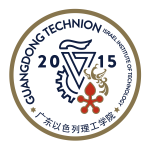Guangdong Technion - Israel Institute of Technology (GTIIT), China & Technion-Israel Institute of Technology, Israel.
The Chemical Engineering Program (group of Yan Wang) is looking for 3–4 PhD/Master candidates to conduct research projects in soft electronics and their biomedical applications.
Contract duration: 2–3 years for Master and 3 + 1 years for PhD.
Current commercial wearable electronics are mainly based on rigid circuit boards which do not have true ‘wearability’ on curvilinear, soft human skin. To achieve better signal quality, soft wearable electronics have been arising as a result of the synergy between healthcare and technology. Soft biomedical devices can be seamlessly integrated to human skin or other biological tissues for ambulatory bio-signal monitoring. Such seamless integration enables accurate, continuous, and long-term acquisition of biometric information without the necessity for an external power supply or bulky connecting wires. We are seeking for highly motivated MS and PhD students to join our group and engage in exciting research towards ambulatory health care using soft electronics. We work in a collaborative international environment, with scientists with diverse backgrounds and expertise. Welcome to contact Prof. Wang for further details.
nanomaterials, materials design, nanofibers/wires, flexible/interface design, mechanical engineering, smart textiles, energy devices, electronics skins, biomedical sensors, health monitoring, human-machine interfaces
For PhD positions
- Master’s degree (or equivalent) in in Chemical Engineering, Chemistry, Electrical Engineering, or Material Science (essential)
- Strong background in soft electronics, material science (preferable)
- Strong interest in electronic skins, wearable electronics (essential)
- Good communication skills, good English skills (essential)
- Ability to work independently as well as in a team environment (essential)
- Ability to author/co-author high-quality scientific publications (essential)
For Master positions
- BSc degree (or equivalent) in Chemical Engineering, Chemistry, Biomedical Engineering, Electrical Engineering, or Material Science (essential)
- Strong interest in electronic skins, wearable electronics (essential)
- Good communication skills, g good English skills (essential)
- Ability to work independently as well as in a team environment (essential)
- Ability to author/co-author scientific publications (desired)
The PhD/Master candidates must fulfill the requirements for admission to the Technion Graduate School and needs to comply with its regulations leading to the PhD/master’s degree:
Links for application procedures:
Dr. Yan Wang is an assistant professor, independent PI in the Department of Chemical Engineering at Israel Institute of Technology, Technion-Guangdong. Dr. Wang completed PhD in 2018 at Monash University majoring in Chemical Engineering, under the supervision of Prof. Wenlong Cheng and Prof. George P. Simon, with a focus on stretchable electronic skin sensors and energy devices. From 2019 to 2021, Dr. Wang worked as a postdoctoral researcher in Prof. Takao Someya’s group (a pioneer of flexible electronics) at The University of Tokyo, mainly focusing on ultrasoft nanomesh skin electronics and its application in long-term health monitoring. She joined GTIIT in November 2021.
In soft electronics field, Dr. Yan Wang has published > 30 peer-reviewed scientific papers in flagship journals like Science, Science Advances, PNAS, Advanced Functional Materials, Advanced Energy Materials, ACS Nano, and Materials Horizons in the last five years, with an h index of 20. She also applied for 1 Chinese patent, 1 US patent, and 2 Japanese patents. Some of her research works were featured by CNN, Science, Nature Materials, Tech Explorist News, New Atlas, Innovations Report, Utokyo focus, Miragenews Azosensors, Technology Networks, News Mynavi, Phys Org, Nanowerk, Science Daily, Newsbeezer, News Break, Florida News Times, Chemical & Engineering News and major Australia medias, such as Herald Sun, Australia SBS evening news, and 9 news.
Awards:
2019 Chinese Government Award for Outstanding Self-financed Students Abroad
2018 Nanoscale Horizons Outstanding Paper Runner-up Award 2018
2017 Postgraduate Travel Grant Award
2014–2018 Monash International Scholarship, PhD program
2014 National Postgraduate Scholarship
2014 Honour of Excellent Graduation Thesis
2014 Outstanding Postgraduate Award
2013 ‘Challenge Cup’ Bronze Award
After joining Guangdong Technion (GTIIT), Yan will continue focusing on materials development and the practical implementation of soft wearables in real-life situations. The research directions include but are not limited to the following:
- Nanomesh enabled wearable/implantable electronic devices for applications in biomedical applications, human-machine interfaces, VR/AR experiences, etc.
- Design, fabrication, and implementation of ultrathin on-skin sensors/sensor arrays.
- Investigation and application of unconventional nanowire-based materials in the field of soft optoelectronics.
We are seeking for highly motivated MS/PhD students/postdocs/research assistants to join our team and engage in exciting research towards ambulatory health care using soft wearables. We work in a collaborative international environment, with scientists of diverse backgrounds and expertise. The lab has sufficient space and funding, brand new laboratories and offices, a first-class public research platform, and a good working environment. Welcome to contact Prof. Wang for further details.

